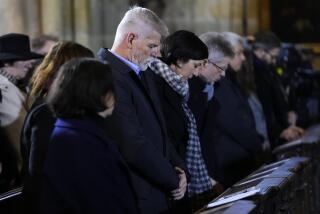âHurrah for the Redsâ to the End : Czechoslovakia: The fragile skein of pretense unraveled quickly because ideological commitment was weak.
Itâs amazing how fast a regime can fall when its hour finally comes. And yet the pretense of normalcy continues right until the last moment. Take Czechoslovakia, which two weeks ago was celebrating the Great October Socialist Revolution in its customary lavish fashion.
All stores and public buildings were hung with red flags. Giant billboards screamed âWith the Soviet Union forever--and no other way.â Cardboard cutouts of Mikhail S. Gorbachev and Czech Communist Party leader Milos Jakes gazed from store windows, where they competed with wristwatches, meat and vegetables for shoppersâ attention.
Schoolchildren, college students and workers obediently trooped to local parades and listened to speeches. And these same speeches were blandly transcribed in the nationâs newspapers, beneath banner headlines in scarlet newsprint. âHurrah for the 72nd anniversary of the October Revolution.â
The main party daily, Rude Pravo, devoted its front page to âOctober.â Prime coverage, as expected, was given to party festivities. Leadersâ names were highlighted in block print. Even the slogan decorating the wall of Pragueâs Palace of Culture was reproduced in boldface for readers in case they couldnât make it out from the photo: âIn the spirit of the inheritance of Great October, in firm alliance with the Soviet Union for perestroika and the democratization of society.â
Texts of various high-level greetings sent to Moscow followed. An insert in the center of the page directed readers to such items inside as âLenin in postage-stamp formâ and huge file photographs of the cruiser Aurora and crowds of Bolsheviks in the ârevolutionary Petrogradâ of October, 1917.
âIt would be funny if it wasnât so tragic,â a Moravian friend of mine commented. And yet Iâm sure many Czechs and Slovaks felt a certain relief as they ran their eyes over the front page. I say this because I felt it myself. The relief, almost the satisfaction, of familiarity. It told its readers that nothing had changed. That the government was doing its job. No need to worry just yet about opposition, democracy, protest.
Short-wave radio reports spoke of radical change in Poland and Hungary, border countries that to Czechs seemed an ideological ocean away . . . but Bulgaria? East Germany? Who would have expected it?
The Czechs like to tell jokes about themselves. Here is one that was making the rounds: A Russian, an American and a Czech are asked âWhat is your personal opinion on the shortage of goods in the stores?â The Russian answers, âGoods? Whatever are goods? I donât know that word.â Next the American responds: âShortage? Whatâs that? Whatâs a shortage?â And finally, the Czech: âI have no problem with those two words, but whatâs a personal opinion?â â
Was it then some kind of national stultification or intellectual paralysis that made Czechoslovakia one of the last countries to move? More likely the opposite--an all-too real sense of what tragic personal consequences an unsuccessful act of protest might bring. Whenever a foreigner mentioned the silence of Czechoslovakia under communism, Czechs would either blush and say, âWeâre cowards,â or shrug noncommitally and say, âWeâre not fools.â All political commentators agree that it was the memory of the 1968 Soviet-led invasion that toppled reform-minded leader Alexander Dubcek--and the fear that it could happen again--that discouraged organized public protest for the last 20 years. Warsaw Pact tanks occupying the country overnight. Half a million people expelled from the party and dismissed from their jobs. It is these people, the Dubcek generation, who have stood before their sons and daughters for so many years as the personification of restraint: âThe police are stronger than you. Concentrate on your career, family life. Otherwise theyâll break you as they did us.â
The young used to listen to this advice and take it to heart, yet they would wring their hands in self-reproach at their own passivity. Listen to a steelworkerâs reasons for attending the âvoluntaryâ worker solidarity meeting at his collective. âI would like to make a statement and not go to this meeting. But it would be noticed. Something would be said. As a non-party manager, I am little trusted as it is. I would be summoned by the director. I would lose my job. My family would suffer. My daughter would not be able to attend university. Better to be bored and irritated for an hour and a half than to pay that kind of price. Even if it makes me feel cheap inside.â
This argument, of course, is only as strong as the social consensus that bolsters it. And this social consensus can only be as strong as the police who keep that society in place--who, in turn, are only as strong, or as brutal, as the government feels it can get away with letting them be. It is a fragile skein of fear and pretense that can come undone quickly, particularly when the elite is as ideologically uncommitted and as ready to transfer its allegiances as most Czech and Slovak party members seem to be. Any members I talked to were slightly apologetic about their affiliation: âI had to do it for my children.â âYou canât have a position like mine without party membership.â âI wouldnât be at this university if I hadnât joined. But donât worry, you can trust me.â
On Nov. 7 of every year, according to Czechoslovak tradition (a tradition that dates only from Communist accession to power in 1948), factory horns blast and sirens wail for a full minute at noon. The horns and sirens are intended to symbolize the joy and harmony of workers laboring free of exploitation in their own workersâ state. They are the musical instruments of October, 1917.
As I heard the hooting this year from the castle overlooking the center of Brno, Czechoslovakiaâs third-largest town, I wondered what it was. At first, it seemed startling, jarring, disturbing--some carpenters doing restoration work beside me stopped to stare and exchange glances. Then, as it continued, the clang and roar seemed to dull, and blend in with the cityâs other sounds, the birds, the heavy trucks, the carpenters back at their work, and I thought: âThis country is the same as ever. Itâs functioning as normal. It will never change.â
More to Read
Sign up for Essential California
The most important California stories and recommendations in your inbox every morning.
You may occasionally receive promotional content from the Los Angeles Times.










